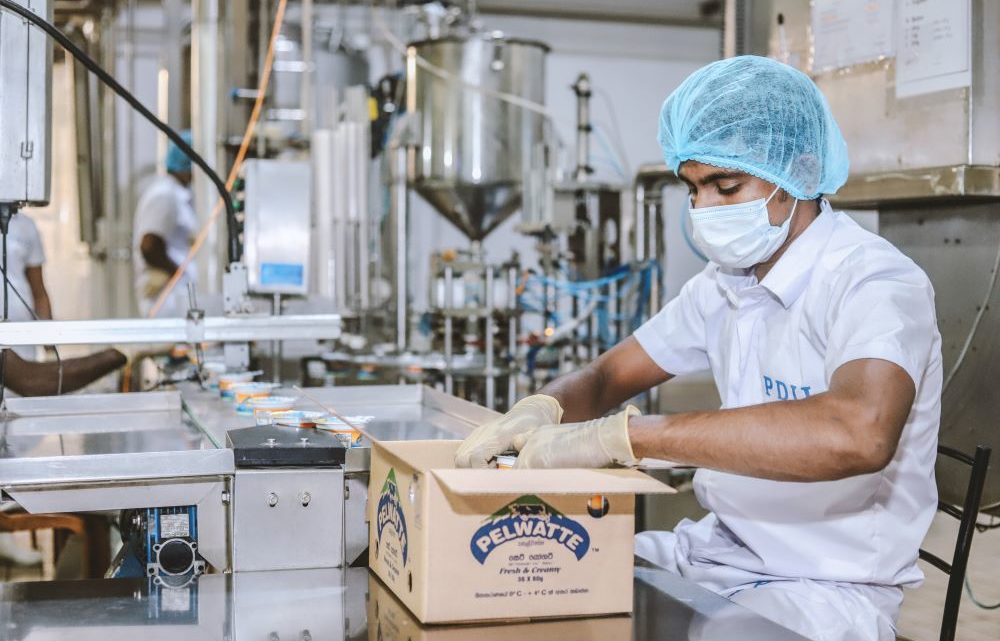Pelwatte to explore continued local dairy self-sufficiency Post COVID-19

The local dairy industry leader, Pelwatte, has pledged to ensure continued exploration towards establishment of self-sufficiency in the local dairy industry. At a meeting con-ducted with the Senior Members of the Government of Sri Lanka, when probed on the threshold of self-sufficiency post COVID-19, in all agricultural and food products in Sri Lanka, Pelwatte denoted their commitment and practical possibility towards supplying continuous dairy products during the COVID-19 situation and post COVID 19.
Following the continued curfew and other contingency measures that were enforced by the GOSL since 20th March 2020, it was declared by the Government that they would enforce a continued limitation on import of non-essential items and certain types of food commodities. As such, it was a need of the moment that the local Food & dairy processors contributed their proposals, suggestions and issues that would support the GOSL to conduct a detailed study on mechanisms to ensure self-sufficiency in all agricultural and food products while overcoming the strains of the short time allowed, to champion the challenge. Heeding to the government’s request, Pelwatte has brought up crucial information in terms of uplifting the local dairy farmers which would pave the path towards the self-sufficiency of the dairy industry in Sri Lanka.
“At present, we are ensuring our farmers are benefitted with the best possible price for their raw milk/ farm gate prices, however the company and the local dairy industry at large is not in a position to provide more support to the farmers in terms of upgrading the farming enterprises through micro financing. This is an area we would require the government’s support, as that would be a giant leap in establishing long term self-sufficiency in the dairy industry. Such an initiative would entail improvement of the feed/diet of cattle by high yield grass, fodder, silage and concentrated feed, as well as enabling farmers to get more heifers that would help increase the size of their heard, possibly from climatized, native or regional breeds,” chronicled, Akmal Wickramanayake, Managing Director, Pelwatte Dairy Industries.
“Local dairy processors have shown time and time again that their product quality is far superior and definitely more fresh than imported products. We at Pelwatte guarantee the time taken from Farm Gate to Retail Outlet shelves is Less than 72 hours, which cannot be claimed by imported brands. During the COVID-19 crisis, citizens themselves became more convinced that they will use local brands. But challenges lie for local brands to be able to fill the shelves with enough stocks regularly to ensure that all citizens have access to fresh local dairy products, and the key to this lies in the success of our supply chain and steady sustainable growth of the small holder dairy farmers,” emphasized Wickramanayake, highlighting the challenges in the path to self-sufficiency in the local dairy industry.
Pelwatte identifies feeding the cattle high energy rations with the correct balance as a key to increasing daily output of milk per cow by as much as 50% within a short time span of 2 months. This would have an inadvertent positive impact towards the self-sufficiency of the industry as it is one of the key challenges faced by Small holder dairy farmers.
The GOSL has awarded the local dairy industry with a price increase of Full Cream Milk Powder, with the new MRP set at Rs.945 per kg and Rs 380 per 400g as of 28th April 2020, as a first step in the direction to self-sufficiency. This was based on the appeal made by the Local Milk Powder Manufacturer’s that at the pre-existing set Full Cream Milk Powder MRP they were barely breaking even. This put the local dairy processors in a quandary, in terms of supply chain improvements, i.e extension of farmer network. Accordingly, it was requested from the government to increase the MRP that allows the processors to generate the profits that could be reinvested in Small Holder Farmer Extension Network.
According to Laksiri Amaratunga, General Manager, the Governments initiative to take steps to establish ‘the correct price’ through the increased MRP would enable them to reinvest in the supply chain that consists of 90% small holder farmer who do not have financial means to expand the heard numbers and improve productivity. The majority of these farmers use outdated methods of farming and animal husbandry, which is a contributing factor towards the low productivity.







